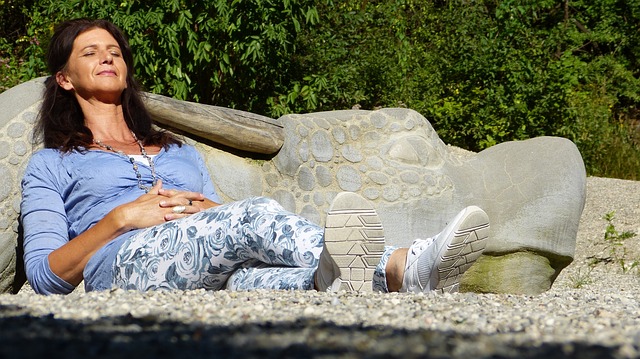Stress is a natural part of life, and it may help inspire you to get things done. Even severe stress caused by a serious disease, job loss, a death in the family, or a traumatic life event might be considered normal. You may feel low or nervous for a period, which is typical.
Download Branding Resources Guide
Building a brand starts by having the right tools and advice. Download our top 10 essential tools and resources to kick-start your branding.

Consult your doctor if you have been feeling low or nervous for more than a few weeks or if it is interfering with your home or work life. Therapy, medicine, and other approaches can all be beneficial.
Meanwhile, there are certain things you can do to assist you to handle stress before it becomes too much. There’s a lot more you can do to aid with stress management. Consider the following lifestyle changes:
What exactly Is stress?

The body’s response to a challenge or demand is referred to as stress. Everyone feels stress, which may be induced by a variety of situations, ranging from little inconveniences to big life upheavals such as divorce or job loss. Physical components of the stress reaction include raised heart rate and blood pressure, thoughts and personal ideas about the stressful experience, and emotions such as fear and wrath. Although we commonly associate stress with unpleasant events, it may also result from positive developments in your life, such as receiving a promotion at work or having a new baby. If you’re someone who is struggling with stress, a great first option to try reducing this is by trying some supplements. For instance, any that contain Ashwagandha (like these here) are great to help reduce stress, become calmer, and improve sleep.
Exercise

To begin, physical activity can help you sleep better. Improved sleep also equates to better stress management. Doctors aren’t sure why, but those who exercise more get better deep “slow-wave” sleep, which helps regenerate the brain and body. Consider exercise options that also have specialized stress-relieving effects, such as yoga, tai chi, Pilates, or one of the martial arts, which are all excellent methods to release pent-up tension and negativity. Just be careful not to exercise too close to bedtime, as this might interfere with sleep for some individuals.
Exercise appears to improve mood as well. Part of the explanation might be that marijuana causes your body to release a variety of chemicals such as endorphins and endocannabinoids, which assist block pain, promoting sleep, and antedating you. Some of these (endocannabinoids) are thought to be responsible for the euphoric feeling, or “runner’s high,” that some individuals experience after lengthy runs.
Diet
The advantages of consuming healthy meals extend beyond your waistline and into your mental health. A nutritious diet can help to reduce the impacts of stress, strengthen your immune system, balance your mood, and lower your blood pressure. Excess sugar and fat can have the opposite impact. When you’re under a lot of stress, junk food might appear even more attractive.
Look for complex carbs, lean proteins, and fatty acids in fish, meat, eggs, and nuts to keep healthy and balanced.
Antioxidants are also beneficial. They shield your cells from the harm that continuous stress can inflict. They may be found in a wide range of foods, including beans, fruits, berries, vegetables, and spices such as ginger.
With a few basic suggestions, you can maintain a nutritious diet. Create a shopping list. When you leave the house, bring healthful food with you. Avoid processed meals and try not to eat mindlessly.
Deep Breathing Should Be Practiced

Deep breathing is an excellent strategy to lessen sympathetic nervous system activity, which governs the body’s response to a perceived threat. Deep breaths taken in for five seconds, hold for two seconds, then released for five seconds will assist activate your parasympathetic nervous system, which can help lower overall tension and anxiety.
Experiment with belly breathing. Close your eyes, become comfy, and lay one hand on your tummy and the other on your chest. Take a deep, cleansing breath in through your nose. Your belly should rise faster than your chest. Now, exhale through your nose and see how your body relaxes. Repeat.
Meditation
There’s a reason it’s been around for almost 5,000 years. Meditation works successfully for many individuals and offers several advantages. It can reduce tension, anxiety, and chronic pain while also improving sleep, energy, and mood.
Guided meditation is an excellent approach to divert your attention away from the stresses of everyday living. There are several guided meditations accessible on the internet that might assist you in finding 5 minutes of focused calm.
Make Time For Your Hobbies

You must make time for activities that you like. Try to do something that makes you feel good every day to help reduce stress. It doesn’t have to take long; even 15 to 20 minutes would suffice.
Daily pressures might sneak up on you before you know it, so schedule at least one soothing activity per day. Listening to music, meditating, writing in a notebook, or taking a body skincare relaxing bubble bath are all excellent methods to unwind and de-stress. Taking care of oneself is essential for stress prevention and management. Do it the way you understand to some it might entail picking up those eyelash extension tools wholesale you bought and doing a face while to others it is taking a long-needed nap.
Conclusion
Everyone experiences stress; it is hard to escape it entirely. However, stress may be managed by having reasonable expectations of yourself, knowing how to keep difficulties in perspective, and taking calming getaways from the regular pressures of life.

